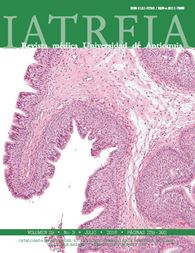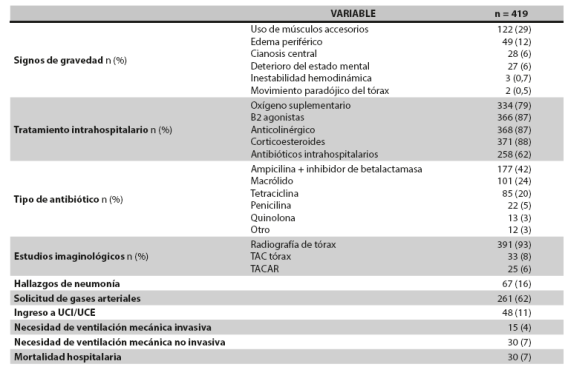Appropriate use of antibiotics in patients with exacerbations of chronic obstructive pulmonary disease (COPD) treated in a hospital at Medellín, Colombia
DOI:
https://doi.org/10.17533/udea.iatreia.v29n3a02Keywords:
adherence, antibiotics, COPD, exacerbation, GOLD GuidelinesAbstract
Objective: to evaluate the adherence to clinical guidelines for appropriate use of antibiotics in patients with COPD exacerbations, and to explore the association between this prescription and clinical outcomes.
Methods: a retrospective cohort study of patients admitted with COPD diagnosis between January 1, 2010 and December 31, 2012. The following variables were recorded: socio-demographic characteristics, spirometric classification, oxygen use at home, number of exacerbations in the previous year, recent antibiotic use, previous need for mechanical ventilation, previous vaccination, comorbidities, clinical presentation, antibiotic use indications and vital status.
Results: 419 patients were included, 59 % (n = 247) were women, median age was 76 years, 62 % had clinical diagnosis, 75 % had an established outpatient management and 11 % had been previously treated for exacerbation of COPD. Out of 170 patients with any indication for using antibiotics the latter were prescribed in 140 (82 %), while 118 (47 %) of 249 patients with no criterion for their use received them. Mortality rate was higher in the group with indications for antibiotics.
Conclusions: an acceptable level of adherence to guidelines was observed in the use of antibiotics when indicated. However, the percentage of patients in whom antibiotics were unnecessarily prescribed seems to be larger than expected and demands further investigation.
Downloads
References
(1.) Dixit D, Bridgeman MB, Andrews LB, Narayanan N, Radbel J, Parikh A, et al. Acute exacerbations of chronic obstructive pulmonary disease: diagnosis, management, and prevention in critically ill patients. Pharmacotherapy. 2015 Jun;35(6):631-48. DOI 10.1002/phar.1599.
(2.) Snow V, Lascher S, Mottur-Pilson C; Joint Expert Panel on Chronic Obstructive Pulmonary Disease of the American College of Chest Physicians and the American College of Physicians-American Society of Internal Medicine. Evidence base for management of acute exacerbations of chronic obstructive pulmonary disease. Ann Intern Med. 2001 Apr;134(7):595-9.
(3.) Vestbo J, Hurd SS, Agustí AG, Jones PW, Vogelmeier C, Anzueto A, et al. Global strategy for the diagnosis, management, and prevention of chronic obstructive pulmonary disease: GOLD executive summary. Am J RespirCrit Care Med. 2013 Feb;187(4):347-65.
(4.) Myint PK, Lowe D, Stone RA, Buckingham RJ, Roberts CM. U.K. National COPD Resources and Outcomes Project 2008: patients with chronic obstructive pulmonary disease exacerbations who present with radiological pneumonia have worse outcome compared to those with non-pneumonic chronic obstructive pulmonary disease exacerbations. Respiration. 2011;82(4):320-7. DOI 10.1159/000327203.
(5.) Saint S, Bent S, Vittinghoff E, Grady D. Antibiotics in chronic obstructive pulmonary disease exacerbations. A meta-analysis. JAMA. 1995 Mar;273(12):957-60.
(6.) Daniels JM, Snijders D, de Graaff CS, Vlaspolder F, Jansen HM, Boersma WG. Antibiotics in addition to systemic corticosteroids for acute exacerbations of chronic obstructive pulmonary disease. Am J Respir-Crit Care Med. 2010 Jan;181(2):150-7.
(7.) Fantin B. Reduced antibiotic pressure for the treatment of acute exacerbation of chronic obstructive pulmonary disease: back to the future. Clin Infect Dis. 2010 Jul;51(2):150-2.
(8.) Tsai CL, Ginde AA, Blanc PG, Camargo CA. Improved care of acute exacerbation of chronic obstructive pulmonary disease in two academic emergency departments. Int J Emerg Med. 2009 Feb;2(2):111-6.
(9.) Stefan MS, Rothberg MB, Shieh MS, Pekow PS, Lindenauer PK. Association between antibiotic treatment and outcomes in patients hospitalized with acute exacerbation of COPD treated with systemic steroids. Chest. 2013 Jan;143(1):82-90.
(10.) Stockley RA, O›Brien C, Pye A, Hill SL. Relationship of sputum color to nature and outpatient management of acute exacerbations of COPD. Chest. 2000 Jun;117(6):1638-45.
(11.) Boggon R, Hubbard R, Smeeth L, Gulliford M, Cassell J, Eaton S, et al. Variability of antibiotic prescribing in patients with chronic obstructive pulmonary disease exacerbations: a cohort study. BMC PulmMed. 2013 May;13:32.
(12.) Molfino NA. Tratamiento de pacientes con enfermedad pulmonar obstructiva crónica (EPOC) por médicos clínicos generales. Medicina (B Aires). 2004 Sep-Oct;64(5):445-54.
(13.) Tang CY, Taylor NF, McDonald CF, Blackstock FC. Level of adherence to the GOLD strategy document for management of patients admitted to hospital with an acute exacerbation of COPD. Respirology. 2014 Nov;19(8):1191-7.
(14.) Masoompour SM, Mohammadi A, Mahdaviazad H. Adherence to the Global Initiative for Chronic Obstructive Lung Disease guidelines for management of COPD: a hospital-base study. ClinRespir J. 2014 Oct.
(15.) Khialani B, Sivakumaran P, Keijzers G, Sriram KB. Emergency department management of acute exacerbations of chronic obstructive pulmonary disease and factors associated with hospitalization. J Res Med Sci. 2014 Apr;19(4):297-303.
(16.) Fanning M, McKean M, Seymour K, Pillans P, Scott I. Adherence to guideline-based antibiotic treatment for acute exacerbations of chronic obstructive pulmonary disease in an Australian tertiary hospital. Intern Med J. 2014 Sep;44(9):903-10.
(17.) Roede BM, Bindels PJ, Brouwer HJ, Bresser P, de Borgie CA, Prins JM. Antibiotics and steroids for exacerbations of COPD in primary care: compliance with Dutch guidelines. Br J Gen Pract. 2006 Sep;56(530):662-5.
(18.) Rothberg MB, Pekow PS, Lahti M, Brody O, Skiest DJ, Lindenauer PK. Antibiotic therapy and treatment failure in patients hospitalized for acute exacerbations of chronic obstructive pulmonary disease. JAMA. 2010 May;303(20):2035-42.
Published
How to Cite
Issue
Section
License
Copyright (c) 2016 Iatreia

This work is licensed under a Creative Commons Attribution-ShareAlike 4.0 International License.
Papers published in the journal are available for use under the Creative Commons license, specifically Attribution-NonCommercial-ShareAlike 4.0 International.
The papers must be unpublished and sent exclusively to the Journal Iatreia; the author uploading the contribution is required to submit two fully completed formats: article submission and authorship responsibility.



















